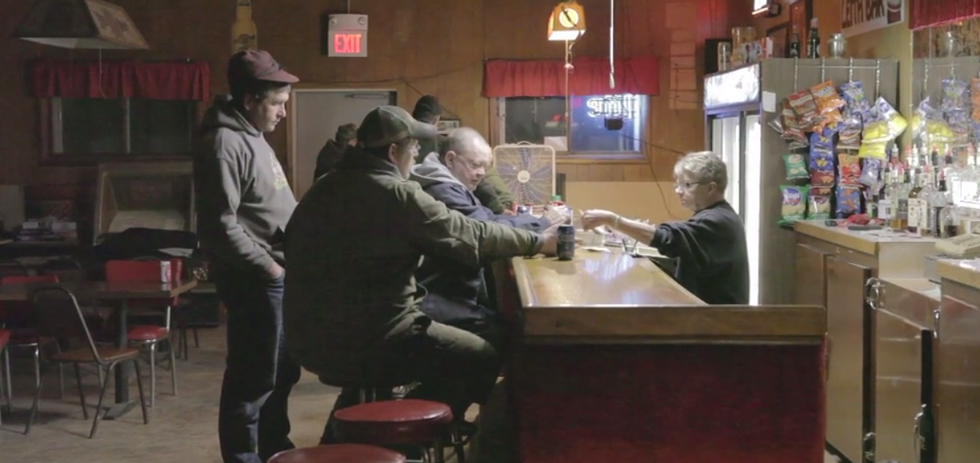
Until the later months of 2013, the town of Leith in North Dakota, the land of which is three square miles, had 24 residents. It was a quiet and isolated rural area, a place where the town’s mayor, Ryan Schock, drove the school bus in the morning before tending to his farm. Six months later, we watch as Schlock leads a group of locals in tearing down and burning a neighbouring house, then teaches his wife how to fire a handgun in an empty field. The journey from serenity to paranoia is what drives Welcome to Leith, a measured and ever-interesting look at the dissolution of moral and legal ideas of civil liberties upon the arrival of some thoroughly undesirable people. In a sense it’s similar to Jesse Moss’ The Overnighters, another North Dakota-set documentary that played at last year’s Sydney Film Festival, but here the uprising of the town isn’t as a result of selfishness but fear – their new neighbours aren’t homeless unemployed men, they’re a group of white nationalists set on turning the town into the headquarters for their movement.
The first ten minutes of Michael Beach Nichols and Christopher K. Walker’s film is an expert example of puncturing expectations. The film appears to focus on an isolated yet caring community, people brought together after fleeing personal tragedy or a desire for privacy, we’re told “it’s very rural America, everyone has each others’ backs.” The arrival of Craig Cobb initially appears to be just an outsider story focusing on (Cobb’s words) “a cantankerous old man,” that is, until the filmmakers cut to talking head interviews with workers at the Southern Poverty Law Center (SPLC), an Alabama-based organisation focusing, in part, on eradicating hate groups in the United States.
Cobb’s plan for Leith involved purchasing the dirt cheap plots of land in the town and leasing them to other prominent White Supremacists, which would allow them to vote in the local council election, with the aim being a legally sound political takeover. Thankfully, rather than turn in a sensationalist account of modern Nazism or one-sided defense of a town under political siege, Nichols and Walker have crafted one of the most nuanced and compelling looks at civil liberties in recent American documentary history, and they’ve done it through a logically simple yet narratively risky approach – not demonising the white supremacists who demonise so many around them.
Welcome to Leith acts as a piece of quasi-direct cinema, a somewhat journalistic account sans voiceover or lengthy intertitles, and with the only traditional talking heads interviews coming from the member of the SPLC; every other interviewee is filmed in their home and all are a part of the events in Leith. This incredible access to people and events sees Nichols and Walker film inside the homes of the residents of Leith and the incoming white supremacists, crafting a very clever juxtaposition of ideology but also persecution, as the film shifts from tracking the fears of the townsfolk to the fears of the white supremacists living there. This duality of focus is first fully realised when the directors have cameras on both sides of a protest against Cobb and his fellow xenophobes. The shifting loyalties of the viewer, though, are part of what make Welcome to Leith even more impressive; whilst Cobb and his fellow white nationalists are clearly painted as the danger in the town, as the film progresses his claims of having his civil liberties impinged upon actually hold water. The late move to a focus on a court trial underlines this, as well as pointing out the lack of knowledge surrounding the way the law works, and the often vast chasm between a moral and legal sense of right and wrong.
By listening to Cobb and his closest associate in Leith, Kynan Dutton, an army veteran who sports a Hitler moustache, we hear the expected tone-deaf diatribes (“the NAACP exists for blacks…we are nothing that isn’t what they do”) but also see startling moments of intimacy, at one point late in the film we watch Dutton prepare a cake for his family and talk about his dreams of opening a restaurant. Nichols and Walker continually remind the viewer that this battle of ideologies has human stakes, the presence of children in the houses of families on both sides says as much.
The establishment of tone, then, is paramount to a documentary such as this, and the cinematography, editing and score all work in harmony to achieve this. A lot of the film is composed of footage not shot by Nichols and Walker – mobile phone recordings of town meetings, photography from a man in the town – so the film’s very existence is tied to its editing, with these clips creating an even greater sense of intimacy when placed alongside the filmmakers’ footage of the town; there’s another striking visual juxtaposition, the impressive landscape cinematography that serves to highlight the beauty and isolation of Leith is intercut with the decay of buildings surrounding and within the town. All of this is accompanied by the snarling musical score from T. Griffin (who also scored The Overnighters), and the fractured sounds of a tortured saxophone line effectively ratchet up the tension.
Not only does Welcome to Leith have a compelling and unusual premise, its execution is assured and intelligent, smartly steering clear of didacticism in favour of a carefully crafted objectivity amidst intimacy. It is ostensibly a film about ideological conflicts but it manages to also tell a story of civil liberties, family, journalism and the law, and in that Nichols and Walker have made one of the most surprising, and likely one of the best, documentaries of the year, let alone the festival.
Around the Staff
| Felix Hubble | |
| Jeremy Elphick | |
| Brad Mariano | |
| Christian Byers | |
| Dominic Barlow |
